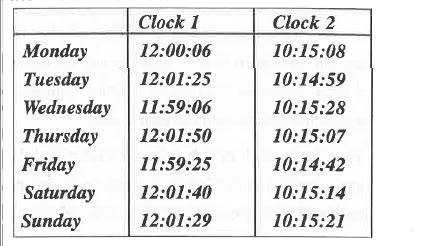Two clocks are being tested against a standard clock located in a national laboratory. At 12:00:00 noon by the standard clock, the readings of the two clocks are :
Clock1Clock 2Monday12:00:05:10:15:06Tuesday12:01:1510:14:18Wednesday11:59:0810:15:18Thursday12:01:5010:15:07Friday11:59:1510:14:53Saturday12:01:3010:15:24Sunday12:01:1910:15:11Sunday12:01:1910:15:11
If you are doing an experiment that requires precision time interval measurements, which of the two clocks will you prefer? The range of variation in time of clock ?Solution in Gujrati
The range of vartiation in the time of clock -1
12:01:5011:59:0800:12:42
∴120+42=162 seconds
The range variation in time of clock -2
10:15:2411:59:0800:00:31
Standard time is 12:00:00
The average time of clock - 1 is nearby standard time. Whereas the average time of clock - 2 is very far from standard time. So, there is a zero error in clock - 2. The important point is that a clock.s zero error is not as significant for precision work as its variation, because zero error can always be easily corrected. The variation of measurement of time in clock-lis 162 s and that of clock - 2 is 31 s. That clock is very perfect in which the variation is very less. In that manner, we have to select clock - 2 for time measurement (measurement of time)
Similar Questions
Two clocks are being tested against a standard clock located in a national laboratory. At 12:00:00 noon by the standard clock, the readings of the two clocks are : If you are doing an experiment that requires 'precision time interval' measurements , which of the two clocks will you prefer ?
View SolutionTwo clocks are being tested against a standard clock located in a national laboratory. At 12:00:00 noon by the standard clock , the readings of the two clocks are : If you are doing an experiment that requires 'precision time interval' measurements, which of the two clocks will you prefer? c
View SolutionTwo clocks are being tested against a standard clock located in a national laboratory. At 12:00:00 noon by the standard clock , the readings of the two clocks are :

If you are doing an experiment that requires 'precision time interval' measurements, which of the two clocks will you prefer? c
View SolutionTwo clocks are being tested against a standard clock located in a national laboratory. At 12:00:00 noon by the standard clock, the readings of the two clocks are :
Clock1Clock 2Monday12:00:05:10:15:06Tuesday12:01:1510:14:18Wednesday11:59:0810:15:18Thursday12:01:5010:15:07Friday11:59:1510:14:53Saturday12:01:3010:15:24Sunday12:01:1910:15:11Sunday12:01:1910:15:11
If you are doing an experiment that requires precision time interval measurements, which of the two clocks will you prefer? The range of variation in time of clock ?
View SolutionTwo clocks are being tested against a standard clock located in a national laboratory At 12 : 00 : 00 noon by standard clock, the readins of the two clocks are
DayClock - IClock - IIMonday12:00:0510:15:06Tuesday12:01:1510:14:59Wednesday11:59:0810:15:18Thursday12:01:5010:15:07Thursday12:01:5010:15:07Friday11:59:1510:14:53Saturday12:01:3010:15:24Sunday12:01:1910:15:11
From the Observations carefully read the following conclusive statements.
Statement I : Zero - error in clock II is much longer than zero - error in clock I.
Statement II : Zero - error can always be corrected by applying necessary corrective measures
Statement III : Precision of clock - I is more than precision of clock - II
Statement IV : Precision of clock - II is more than precision of clock - I
Pick up the correction option from the following.
View SolutionTwo clocks are being tested against a standard clock located in a national laboratory .At 12:00:00 noon by the standard clock, the readings of the two clocks are {:(,"Day 1","Day 2","Day 3","Day 4" , "Day 5"),("Clock 1",12:00:04,12:02:19,12:01:50,11:59:04,11:59:08),("Clock 2",11:15:24,11:15:01,11:14:59,11:15:00,11:14:58):} Which of the two clocks will you prefer to measure the time intervals during an experiment ?
View SolutionTwo clocks A and B being tested against a standard clock located in the national laboratory At 10.00 AM by the standard clock, the readings of the two clocks are shown in following table {:("Day","Clock A","Clock B"),(I^("st"),10:00:06,8:15:00),(II^("nd"),10:01:13,8:15:0.1),(III^("rd"),9:59:0.8,8:15:04),(IV^("th"),10:02:15,8:14:58),(V^("th"),9:58:10,8:15:02):} If you are doing an experiment that requires precision time interval measurements, which of the two clocks will you prefer ?
View Solution

